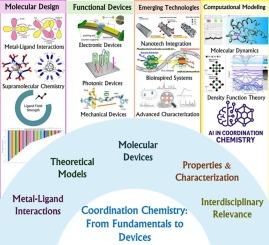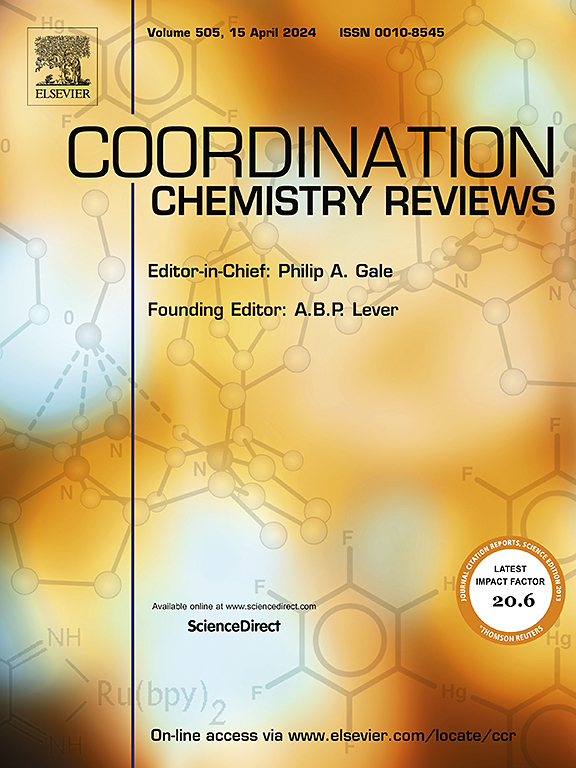从分子纳米结构到器件集成:下一代光子、电子和机械技术中的配位化学
IF 23.5
1区 化学
Q1 CHEMISTRY, INORGANIC & NUCLEAR
引用次数: 0
摘要
配位化学最近见证了变革性的进步,将理论见解与分子电子学,光子学和机械系统的创新应用联系起来。本文综述了配位化合物的设计和利用方面的最新进展,特别强调了它们在现代技术装置中的作用。配合物是通过金属-配体相互作用形成的,在电子、光学和机械性能方面表现出显著的可调性,这使得它们在制造高效分子机器、发光二极管(oled)、太阳能电池和传感器方面不可或缺。密度泛函理论(DFT)、分子动力学(MD)和机器学习(ML)等先进计算工具的集成,为材料的合理设计提供了动力,为设备工程提供了新的预测能力。主要挑战,如稳定性、可扩展性和实时性能,以及通过分子水平设计和复杂的配体工程克服这些障碍的策略进行了讨论。在能源存储、催化和量子计算方面,新兴的生物启发和可持续方法突出了配位化学在应对全球技术和环境挑战方面的变革潜力。随着研究的不断发展,分子配位和现代材料科学之间的协同作用有望重新定义设备功能的界限,实现智能,自适应和节能技术的新时代。本文章由计算机程序翻译,如有差异,请以英文原文为准。

From molecular nanoarchitectonics to device integration: Coordination chemistry in next-generation photonic, electronic, and mechanical technologies
Coordination chemistry has recently witnessed transformative advancements, bridging theoretical insights with innovative applications in molecular electronics, photonics, and mechanical systems. This review synthesizes cutting-edge developments in the design and utilization of coordination compounds, particularly highlighting their role in modern technological devices. Coordination complexes, formed through metal-ligand interactions, exhibit remarkable tunability in electronic, optical, and mechanical properties, making them indispensable in creating efficient molecular machines, light-emitting diodes (OLEDs), solar cells, and sensors. The integration of advanced computational tools such as Density Functional Theory (DFT), Molecular Dynamics (MD), and Machine Learning (ML) has empowered the rational design of materials, offering new predictive capabilities for device engineering. Key challenges, such as stability, scalability, and real-time performance, are discussed alongside strategies for overcoming these hurdles through molecular-level design and sophisticated ligand engineering. Emerging bioinspired and sustainable approaches in energy storage, catalysis, and quantum computing highlight the transformative potential of coordination chemistry in addressing global technological and environmental challenges. As research continues to evolve, the synergy between molecular coordination and modern materials science promises to redefine the boundaries of device functionality, enabling a new era of intelligent, adaptive, and energy-efficient technologies.
求助全文
通过发布文献求助,成功后即可免费获取论文全文。
去求助
来源期刊

Coordination Chemistry Reviews
化学-无机化学与核化学
CiteScore
34.30
自引率
5.30%
发文量
457
审稿时长
54 days
期刊介绍:
Coordination Chemistry Reviews offers rapid publication of review articles on current and significant topics in coordination chemistry, encompassing organometallic, supramolecular, theoretical, and bioinorganic chemistry. It also covers catalysis, materials chemistry, and metal-organic frameworks from a coordination chemistry perspective. Reviews summarize recent developments or discuss specific techniques, welcoming contributions from both established and emerging researchers.
The journal releases special issues on timely subjects, including those featuring contributions from specific regions or conferences. Occasional full-length book articles are also featured. Additionally, special volumes cover annual reviews of main group chemistry, transition metal group chemistry, and organometallic chemistry. These comprehensive reviews are vital resources for those engaged in coordination chemistry, further establishing Coordination Chemistry Reviews as a hub for insightful surveys in inorganic and physical inorganic chemistry.
 求助内容:
求助内容: 应助结果提醒方式:
应助结果提醒方式:


